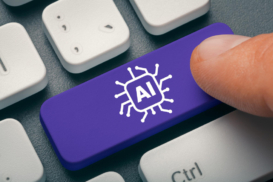Greetings! I'm Aneesh Sreedharan, CEO of 2Hats Logic Solutions. At 2Hats Logic Solutions, we are dedicated to providing technical expertise and resolving your concerns in the world of technology. Our blog page serves as a resource where we share insights and experiences, offering valuable perspectives on your queries.

We’re witnessing a fundamental shift in how GCC organizations compete. From Riyadh to Dubai, AI has moved from experimental technology to a strategic imperative, but implementation remains uneven. At 2Hats Logic, our work across banking, healthcare, and government sectors reveals a clear pattern: organizations treating AI as just another IT project struggle, while those embedding it as a business transformation strategy are pulling ahead dramatically.
With the region’s AI market projected to reach $5.11 billion in 2025, backed by unprecedented government commitment through Vision 2030 and similar initiatives, the transformation landscape is rapidly maturing. This isn’t about whether to adopt AI anymore; it’s about understanding the strategic pillars that turn AI investments into measurable business advantage.
Why AI Is Critical: Five Core Reasons
AI isn’t just another technology trend; it’s fundamentally reshaping how organizations operate, compete, and create value in the GCC. Here are the five core reasons:
1. Accelerating Intelligent Automation
AI-powered automation delivers up to 60% reduction in manual effort and 20-30% productivity gains across business functions.
A leading GCC bank automated 80% of routine customer queries using AI chatbots, response times dropped from hours to seconds, and staff were freed to handle complex issues requiring human judgment. This is intelligent automation: empowering humans to focus on higher-value work.
2. Enabling Data-Driven Decision Making at Scale
AI analyzes massive datasets in real-time, identifying patterns invisible to human analysts. Companies using AI for decision-making respond to market changes 3-5 times faster than competitors. They spot emerging trends, identify risks before they become problems, and seize opportunities while others are still gathering data.
3. Personalizing Customer and Citizen Experiences
AI and natural language processing enable unprecedented personalization across retail, finance, telecommunications, and government services. Smart city initiatives across Dubai, Riyadh, and Doha use AI for Arabic-speaking virtual assistants and personalized e-services that anticipate citizen needs, fundamentally changing how governments interact with their populations.
WARNING: Implementing AI without proper cultural localization can backfire. Always ensure your AI solutions are trained on GCC-specific data, understand local cultural contexts, and provide Arabic language support.
4. Driving Operational Efficiency and Cost Optimization
Organizations implementing AI achieve up to 20% additional cost savings compared to traditional methods. More importantly, operational efficiency builds agility. During COVID-19, organizations with AI-powered operations adapted faster, maintained service levels, and emerged stronger, a resilience that’s now a critical competitive advantage.
5. Unlocking New Business Models and Innovation
AI creates entirely new possibilities for value creation. GCC organizations are developing AI-as-a-Service offerings, creating proprietary intellectual property, and achieving 3-5x faster innovation rollout times. From AI-powered financial products to predictive healthcare solutions, AI enables business models that didn’t exist five years ago.
Ready to explore how AI can transform your organization?
The Three Strategic Pillars of an AI-First Organization
Building an AI-first organization requires focus on three interconnected pillars:
Pillar 1: Intelligent Automation
- Self-optimizing workflows that learn and improve
- Predictive maintenance systems preventing downtime
- Smart infrastructure management for cities and facilities
- Success Story: Dubai’s Smart City uses AI to reduce traffic congestion by 25%
Pillar 2: Data and Decision Intelligence
- Real-time operational dashboards providing instant visibility
- Predictive analytics for market trends and demand forecasting
- AI-powered risk assessment and proactive incident resolution
Pillar 3: Always-On, Intelligent Support
- 24/7 customer and citizen support through AI virtual agents
- Multilingual, culturally-aware interactions (Arabic, English, and more)
- Consistent service quality across all channels
PRO TIP: Start with high-impact, low-complexity use cases to build organizational confidence in AI. Quick wins create momentum and make it easier to secure buy-in for larger transformation initiatives.
Measurable Impact Across Industries
AI is already delivering results across multiple GCC industries:
Banking and Financial Services
- Real-time fraud detection preventing millions in losses
- AI financial advisors providing personalized recommendations
- Automated regulatory compliance and reporting
Healthcare and Life Sciences
- AI-powered diagnostics and imaging analysis
- Predictive patient care enabling early intervention
- Accelerated drug discovery and development
Retail and E-Commerce
- Personalized recommendations increasing sales by 15-30%
- Dynamic pricing optimization
- Demand forecasting reducing waste
Telecommunications
- Predictive network maintenance preventing outages
- Customer churn prevention through early warning systems
- Automated service resolution
Public Sector and Smart Cities
- E-government platforms with AI assistants
- Smart traffic and transportation systems
- Enhanced citizen engagement and service delivery
Overcoming Implementation Challenges
While the benefits of AI are clear, successful implementation requires addressing four key challenges:
Data Privacy and Governance: Implement robust data governance frameworks, use privacy-preserving AI techniques, and ensure compliance with local regulations like Saudi Arabia’s Personal Data Protection Law (PDPL). Getting this right from the start prevents costly problems later.
Change Management and Cultural Adoption: Success requires clear communication about AI as an augmentation tool, comprehensive training programs, visible leadership support, and celebrating early wins. Organizations investing in change management see 3x higher success rates in AI adoption.
Talent Gap: Address the shortage of AI expertise through university partnerships, leveraging global talent via remote work, reskilling existing workforce, and collaborating with specialized AI consulting firms. Cloud-based AI services are reducing the need for deep technical expertise for many applications.
Legacy System Integration: Solutions include adopting API-first architectures, using middleware platforms, implementing gradual phased approaches, and leveraging cloud-based AI services for flexibility. Design for integration from day one rather than treating it as an afterthought.
WARNING: Non-compliance with data privacy regulations can result in severe penalties, legal liability, and reputational damage that takes years to repair. Always consult legal experts specializing in GCC regulations when implementing AI solutions that process personal or sensitive data.
Conclusion
AI-powered digital transformation is no longer optional for GCC organizations seeking global competitiveness. The technology delivers measurable benefits: 60% reduction in manual effort, 20-30% productivity gains, 20% cost optimization, and 3-5x faster innovation. National visions across the region create supportive ecosystems with funding, infrastructure, and policy support.
Success requires addressing challenges around data governance, change management, talent acquisition, and legacy integration, but organizations leading in AI adoption prove these are manageable with the right approach. The future belongs to organizations embracing AI-first strategies today, starting with focused pilots that demonstrate value before scaling enterprise-wide.
FINAL WARNING: The AI transformation window is closing. Organizations that delay risk falling permanently behind competitors already leveraging AI for advantage. The question isn’t whether to adopt AI, but how quickly you can do so strategically.
FAQ
How long does it take to see results from AI implementation?
Simple deployments like chatbots show results in 2-4 months. Medium complexity projects require 6-12 months. Enterprise transformation happens in phases over 18-36 months. Start with quick wins that demonstrate value and build momentum, then progressively tackle more complex challenges.
Will AI eliminate jobs in my organization?
AI augments rather than replaces most jobs. While some routine tasks are automated, AI creates new roles and allows employees to focus on higher-value work. Studies show that for every job displaced by automation, 2-3 new jobs are created in AI development, data management, and AI operations. Successful organizations invest heavily in reskilling and redefining roles.
Can small and medium businesses in the GCC benefit from AI?
Absolutely. Cloud-based AI services have democratized access to sophisticated capabilities. SMBs can leverage pre-built AI models, AI-powered SaaS applications, affordable automation tools with pay-as-you-go pricing, and access global AI expertise through consulting. Many SMBs see faster ROI than large enterprises because they move quickly with fewer legacy constraints.

Related Articles







